- Home
- Joanne Harris
Blueeyedboy
Blueeyedboy Read online
blueeyedboy
JOANNE HARRIS
LONDON • TORONTO • SYDNEY • AUCKLAND • JOHANNESBURG
Contents
Cover
Title
Copyright
Dedication
About the Author
Also by Joanne Harris
Acknowledgements
Part One : Blue
Chapter 1
Chapter 2
Chapter 3
Chapter 4
Chapter 5
Chapter 6
Chapter 7
Chapter 8
Chapter 9
Chapter 10
Chapter 11
Part Two : Black
Chapter 1
Chapter 2
Chapter 3
Chapter 4
Chapter 5
Chapter 6
Chapter 7
Chapter 8
Chapter 9
Chapter 10
Chapter 11
Chapter 12
Chapter 13
Chapter 14
Chapter 15
Chapter 16
Part Three : White
Chapter 1
Chapter 2
Chapter 3
Chapter 4
Chapter 5
Chapter 6
Chapter 7
Chapter 8
Chapter 9
Chapter 10
Chapter 11
Chapter 12
Chapter 13
Chapter 14
Chapter 15
Chapter 16
Part Four : Smoke
Chapter 1
Chapter 2
Chapter 3
Chapter 4
Chapter 5
Chapter 6
Chapter 7
Chapter 8
Chapter 9
Chapter 10
Chapter 11
Part Five : Mirrors
Chapter 1
Chapter 2
Chapter 3
Chapter 4
Chapter 5
Chapter 6
Chapter 7
Chapter 8
Chapter 9
Chapter 10
Chapter 11
Chapter 12
Chapter 13
Chapter 14
Chapter 15
Chapter 16
Part Six : Green
Chapter 1
Chapter 2
Chapter 3
Chapter 4
Chapter 5
Chapter 6
Chapter 7
Chapter 8
Chapter 9
Chapter 10
Chapter 11
This eBook is copyright material and must not be copied, reproduced, transferred, distributed, leased, licensed or publicly performed or used in any way except as specifically permitted in writing by the publishers, as allowed under the terms and conditions under which it was purchased or as strictly permitted by applicable copyright law. Any unauthorised distribution or use of this text may be a direct infringement of the author’s and publisher’s rights and those responsible may be liable in law accordingly.
Version 1.0
Epub ISBN 9781407056289
www.randomhouse.co.uk
TRANSWORLD PUBLISHERS
61-63 Uxbridge Road, London W5 5SA
A Random House Group Company
www.rbooks.co.uk
First published in Great Britain in 2010 by Doubleday an imprint of Transworld Publishers
Copyright © Frogspawn Ltd 2010
The extract from ‘Buffalo Bill’ is reprinted from Complete Poems 1904–1962 by E. E. Cummings, edited by George J. Firmage, by permission of W. W. Norton & Company. Copyright © 1991 by the Trustees for the E. E. Cummings Trust and George James Firmage. Voltaire lyrics reproduced by kind permission of the artist. ‘I Will Kill Again’ by Jarvis Cocker copyright © Warner/Chappell Music Publishing Ltd 2006, all rights reserved. ‘Sugar Baby Love’ by Wayne Bickerton and Tony Waddington copyright © W. B. Music Corp. and Budde Music Inc, all rights reserved.
Joanne Harris has asserted her right under the Copyright, Designs and Patents Act 1988 to be identified as the author of this work.
This book is a work of fiction and, except in the case of historical fact, any resemblance to actual persons, living or dead, is purely coincidental.
A CIP catalogue record for this book is available from the British Library.
ISBNs 9780385609500 (hb) 9780385609517 (tpb)
This book is sold subject to the condition that it shall not, by way of trade or otherwise, be lent, resold, hired out, or otherwise circulated without the publisher’s prior consent in any form of binding or cover other than that in which it is published and without a similar condition, including this condition, being imposed on the subsequent purchaser.
Addresses for Random House Group Ltd companies outside the UK can be found at: www.randomhouse.co.uk The Random House Group Ltd Reg. No. 954009
The Random House Group Limited supports The Forest Stewardship Council (FSC), the leading international forest-certification organization. All our titles that are printed on Greenpeace-approved FSC-certified paper carry the FSC logo. Our paper procurement policy can be found at www.rbooks.co.uk/environment
Typeset in 11/14pt Goudy by Falcon Oast Graphic Art Ltd. Printed and bound in Great Britain by Clays Limited, Bungay, Suffolk
2 4 6 8 10 9 7 5 3 1
To Kevin,
who also has blue eyes.
Joanne Harris is the author of the Whitbread-shortlisted Chocolat (made into an Oscar-nominated film starring Juliette Binoche and Johnny Depp) and seven other best-selling novels: the latest is The Lollipop Shoes. Her hobbies are listed in Who’s Who as ‘mooching, lounging, strutting, strumming, priest-baiting and quiet subversion’. She plays bass guitar in a band first formed when she was sixteen, is currently studying Old Norse, and lives with her husband and daughter in Yorkshire, about fifteen miles from the place where she was born.
www.joanne-harris.co.uk
Also by Joanne Harris
THE EVIL SEED
SLEEP, PALE SISTER
CHOCOLAT
BLACKBERRY WINE
FIVE QUARTERS OF THE ORANGE
COASTLINERS
HOLY FOOLS
JIGS & REELS
GENTLEMEN & PLAYERS
THE LOLLIPOP SHOES
With Fran Warde
THE FRENCH KITCHEN: A COOKBOOK
THE FRENCH MARKET: MORE RECIPES FROM
A FRENCH KITCHEN
For more information on Joanne Harris and her books,
see her website at www.joanne-harris.co.uk
ACKNOWLEDGEMENTS
Some books are easy to write. Some are rather more difficult. And some books are just like Rubik’s cubes, with no apparent solution in sight. This particular Rubik’s cube would never have been solved without the help of my editor, Marianne Velmans, and my agent, Peter Robinson, who encouraged me to persevere. Thanks, too, to my PA, Anne Riley; to publicist Louise Page-Lund; to Mr Fry for the loan of Patch; to copy-editor Lucy Pinney; to Claire Ward and Jeff Cottenden for the cover art; to Francesca Liversidge; Manpreet Grewal; Sam Copeland; Kate Tolley; Jane Villiers; Michael Carlisle; Mark Richards; Voltaire; Jennifer and Penny Luithlen. Thanks, too, to the unsung heroes: the proofreaders; sales executives; book reps and booksellers who are so often forgotten when it comes to handing out the laurels. Special thanks to my friends in fic and fandom, especially to: gl-12; ashlibrooke; spicedogs; mr_henry_gale; marzella; jade_melody; henry_holland; divka; benobsessed. And, of course, to the man in Apartment 7, whose voice was in my mind from the start.
and what i want to know is
how do you like your blueeyed boy
Mister Death
/> e e cummings, ‘Buffalo Bill’
PART ONE
blue
Once there was a widow with three sons, and their names were Black, Brown and Blue. Black was the eldest, moody and aggressive. Brown was the middle child, timid and dull. But Blue was his mother’s favourite. And he was a murderer.
1
You are viewing the webjournal of blueeyedboy posting on:
[email protected]
Posted at: 02.56 on Monday, January 28
Status: public
Mood: nostalgic
Listening to:Captain Beefheart: ‘Ice Cream For Crow’
The colour of murder is blue, he thinks. Ice-blue, smokescreen blue, frostbite, post-mortem, body-bag blue. It is also his colour in so many ways, running through his circuitry like an electrical charge, screaming blue murder all the way.
Blue colours everything. He sees it, senses it everywhere, from the blue of his computer screen to the blue of the veins on the backs of her hands, raised now and twisted like the tracks of sandworms on Blackpool beach – where they used to go, the four of them, every year on his birthday, and he would have an ice-cream cone, and paddle in the sea, and search out the little scuttling crabs from under the piles of seaweed, and drop them into his bucket to die in the heat of the simmering birthday sun.
Today he is only four years old, and there is a peculiar innocence in the way he carries out these small and guiltless slayings. There is no malice in the act, merely a keen curiosity for the scuttling thing that tries to escape, sidling round and round the base of the blue plastic bucket; then, hours later, giving up the fight, claws splayed, and turning its vivid underbelly upwards in a futile show of surrender, by which time he has long since lost interest and is eating a coffee ice cream (a sophisticated choice for such a little boy, but vanilla has never been his taste), so that when he rediscovers it at the end of the day, when the time comes to empty his bucket and to go home, he is vaguely surprised to find the creature dead, and wonders, indeed, how such a thing could ever have been alive at all.
His mother finds him wide-eyed on the sand, poking the dead thing with a fingertip. Her main concern is not for the fact that her son is a killer, but for the fact that he is suggestible, and that many things upset him in a way that she does not understand.
‘Don’t play with that,’ she tells him. ‘It’s nasty. Come away from there.’
‘Why?’ he says.
Good question. The creatures in the bucket have been standing undisturbed all day. He gives it some thought. ‘They’re dead,’ he concludes. ‘I collected them all, and now they’re dead.’
His mother scoops him into her arms. This is precisely what she dreads. Some kind of outburst: tears, perhaps; something that will make the other mothers look down their noses at her and sneer.
She comforts him. ‘It’s not your fault. It was just an accident. Not your fault.’
An accident, he thinks to himself. Already, he knows that this is a lie. There was no accident, it was his fault, and the fact that his mother denies this confuses him more than her shrill voice and the feverish way she clasps him in her arms, smearing his T-shirt with suntan oil. He pulls away – he hates mess – and she fixes him with a fretful gaze, wondering if he is going to cry.
He wonders whether perhaps he should. Maybe she expects it of him. But he can sense how very anxious she is, how hard she tries to protect him from pain. And the scent of his ma’s distress is like the coconut of her suntan oil mixed with the taste of tropical fruit, and suddenly it hits him –Dead! Dead! – and he really does begin to cry.
And so she kicks sand over the rest of his catch – a snail, a shrimp, a baby flatfish all landed and gasping, with its little mouth pulled down in a tragic crescent – smiling and singing; Whoops! All gone! – trying to make a game of it, holding him tightly as she does, so that no possible taint of guilt may darken the gaze of her blue-eyed boy.
He is so sensitive, she thinks. So startlingly imaginative. His brothers are another race, with their scabbed knees and their uncombed hair and their wrestling matches on the beds. His brothers do not need her protection. They have each other. They have their friends. They like vanilla ice cream, and when they play at cowboys (two fingers cocked to make a gun) they always wear the white hats, and make the bad guys pay.
But he has always been different. Curious. Impressionable. You think too much, she tells him sometimes, with the look of a woman too much in love to admit to any real fault in the object of her devotion. He can already see how she worships him, wants to protect him from everything, from every shadow that may pass across the blue skies of his life, from every possible injury, even the ones he inflicts on himself.
For a mother’s love is uncritical, selfless and self-sacrificing; a mother’s love can forgive anything: tantrums, tears, indifference, ingratitude or cruelty. A mother’s love is a black hole that swallows every criticism, absolves all blame, excuses blasphemy, theft and lies, transmuting even the vilest deed into something that is not his fault –
Whoops! All gone!
Even murder.
Post comment:
Captainbunnykiller: LOL, dude. You rock!
ClairDeLune: This is wonderful, blueeyedboy. I think you ought to write more fully about your relationship with your mother and the way it has affected you. I don’t believe that anyone is born bad. We simply make bad choices, that’s all. I look forward to reading the next chapter!
JennyTricks: (post deleted).
JennyTricks: (post deleted).
JennyTricks: (post deleted).
blueeyedboy: Why, thank you . . .
2
You are viewing the webjournal of blueeyedboy.
Posted at: 17.39 on Monday, January 28
Status: restricted
Mood: virtuous
Listening to: Dire Straits: ‘Brothers In Arms’
My brother had been dead for less than a minute by the time the news reached my WeJay. That’s about how long it takes: six or seven seconds to film the scene on a mobile phone camera; forty-five to upload the footage on to YouTube; ten to Twitter to all your friends – 13:06 OMG! Just saw a terrible car crash – and after that the caravan of messages to my WebJournal; the texts; the e-mails, the oh-my-Gods.
Well, you can skip the condolences. Nigel and I hated each other from the day we were born, he and I, and nothing he has ever done – including giving up the ghost – has caused any change to my feelings. But he was my brother, after all. Give me credit for some delicacy. And Ma must be feeling upset, of course, even though he wasn’t her favourite. Once a mother of three, today only one of her children remains. Yours truly, blueeyedboy, now so nearly alone in the world –
The police took their time, as usual. Forty minutes, door-to-door. Ma was downstairs, making lunch: lamb chops and mash, with pie for dessert. For months I’d hardly eaten; suddenly now I was ravenous. Perhaps it takes the death of a sibling to really give me an appetite.
From my room, I followed the scene: the police car; the doorbell; the voices; the scream. The sound of something in the hallway recess – the telephone table, at a guess – slamming against the wall as she fell, cradled between two officers, clutching the air with her outstretched hands, and then the smell of burning fat, probably the chops she left under the grill when she went to answer the door –
That was my cue. Time to log off. Time to face the music. I wondered whether I could get away with leaving in one of my iPod plugs. Ma’s so used to seeing me wearing them that she might not even have noticed; but the two officers were a different matter, of course, and the last thing I wanted at such a time was for someone to find me insensitive –
‘Oh, B.B., the most terrible thing—’
My mother’s a bit of a drama queen. Contorted face, eyes wide, mouth wider, she looked like a mask of Medusa. Holding out her arms to me as if to pull me under, fingers clawing at my back, wailing into my right ear – defenceless now without my iPod – and shedding
tears of blue mascara down the collar of my shirt.
‘Ma, please.’ I hate mess.
The female officer (there’s always one) took over the business of comforting her. Her partner, an older man, looked at me with weary patience, and said:
‘Mr Winter, there’s been an accident.’
‘Nigel?’ I said.
‘I’m afraid so.’
I counted the seconds in my head, whilst mentally replaying Mark Knopfler’s guitar intro to ‘Brothers In Arms’. I knew I was under scrutiny; I couldn’t afford to get this wrong. But music makes things easier, reducing inappropriate emotional responses and allowing me to function, if not entirely normally, then at least as others expect of me.
‘I knew it, somehow,’ I said at last. ‘I had the weirdest feeling.’
He nodded, as if he knew what I meant. Ma continued to rant and rail. Overdoing it, Ma, I thought; it wasn’t as if they were especially close. Nigel was a ticking bomb; it had to happen sooner or later. And car accidents are so common these days, so tragically unavoidable. A patch of ice, a busy road; almost the perfect crime, you might say, almost above suspicion. I wondered if I ought to cry, but decided to keep it simple. So I sat down – rather shakily – and put my head in my hands. It hurt. I’ve always been prone to headaches, especially in moments of stress. Pretend it’s just fiction, blueeyedboy. An entry in your WeJay.
Once more I sought the comfort of my imaginary playlist, where the drums had just come in, ticking gentle counterpoint to a guitar riff that sounds almost lazily effortless. It isn’t effortless, of course. Nothing so precise ever is. But Knopfler has curiously spatulate, elongated fingers. Born for the instrument, you might almost say, destined from birth for that fretboard, those strings. If he had been born with different hands, would he have ever picked up a guitar? Or would he have tried it anyway, knowing he’d always be second-rate?
-->

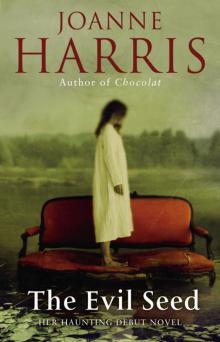 The Evil Seed
The Evil Seed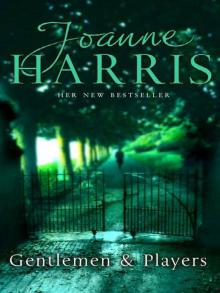 Gentlemen and Players
Gentlemen and Players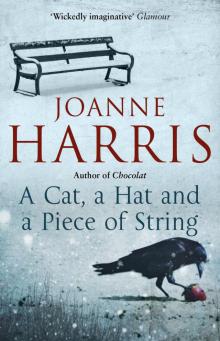 A Cat, a Hat, and a Piece of String
A Cat, a Hat, and a Piece of String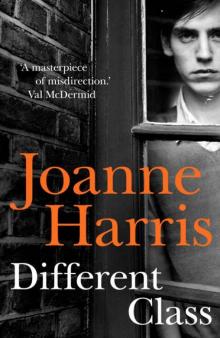 Different Class
Different Class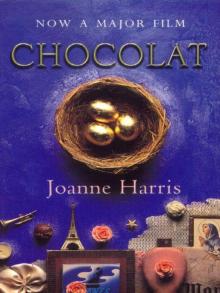 Chocolat
Chocolat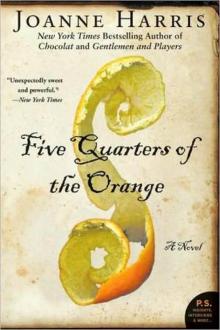 Five Quarters of the Orange: A Novel
Five Quarters of the Orange: A Novel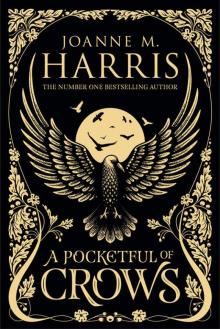 A Pocketful of Crows
A Pocketful of Crows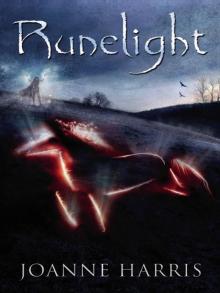 Runelight
Runelight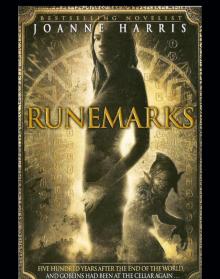 Runemarks
Runemarks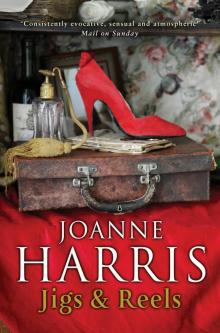 Jigs & Reels: Stories
Jigs & Reels: Stories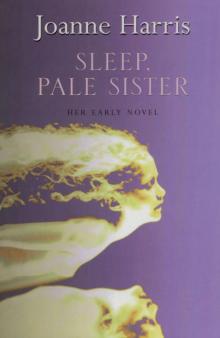 Sleep, Pale Sister
Sleep, Pale Sister Holy Fools
Holy Fools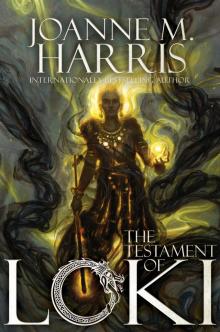 The Testament of Loki
The Testament of Loki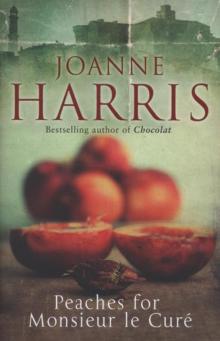 Peaches for Monsieur Le Curé
Peaches for Monsieur Le Curé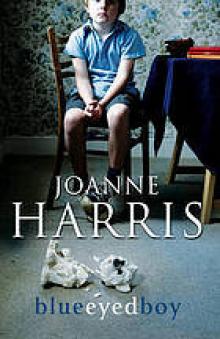 Blueeyedboy
Blueeyedboy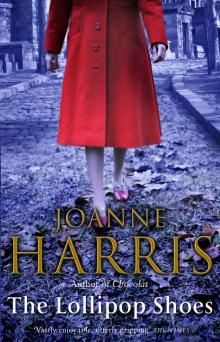 The Lollipop Shoes
The Lollipop Shoes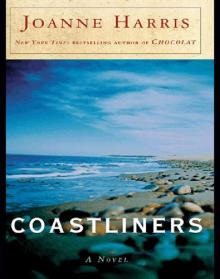 Coastliners
Coastliners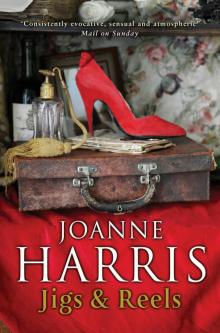 Jigs & Reels
Jigs & Reels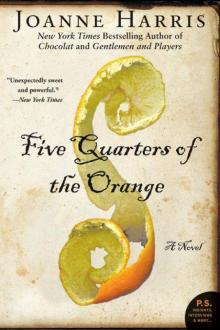 Five Quarters of the Orange
Five Quarters of the Orange